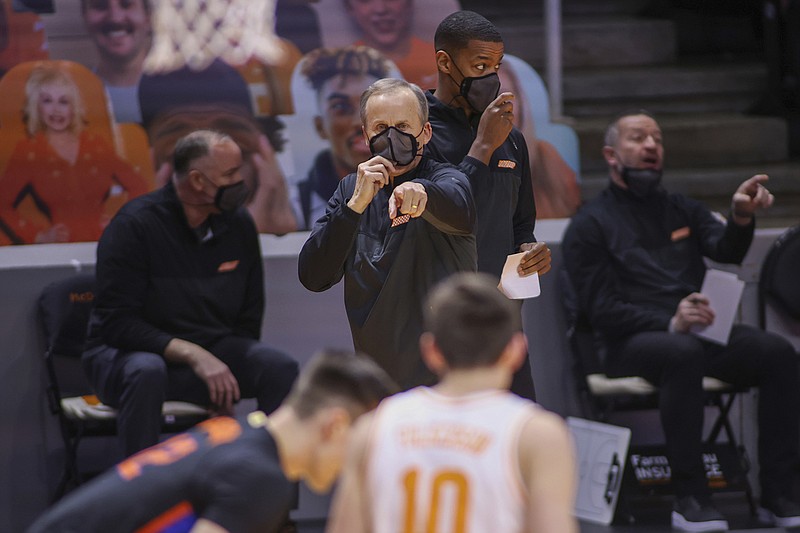They played their final Southeastern Conference basketball game of the year in the University of Tennessee's Thompson-Boling Arena on Sunday afternoon, the home team beating Florida 65-54 after trailing 14 in the opening half.
But was this comeback merely another Tennessee Tease, yet another example of why the Volunteers have become the Dr. J and Mr. Hide of SEC hoops?
Or is the Big Orange finally ready to become the NCAA tournament threat it has occasionally hinted it is when it isn't playing as if it doesn't deserve to reach March Madness?
We may somewhat know the answer to that this week, when the SEC tournament gets underway inside Nashville's Bridgestone Arena. Having earned the No. 4 seed, the Vols won't play until Friday, when they will face the winner of a second-round contest between Florida and the winner of Wednesday night's Vanderbilt-Texas A&M game.
Win that one and the Vols will likely play top-seeded Alabama in a semifinal on Saturday, when we should begin to find out which Tennessee team - Dr. J or Mr. Hide - will reach the NCAA tournament the following week in Indianapolis.
Of course, one need only look to the University of Tennessee at Chattanooga men's brief stay in the Southern Conference tournament this past Saturday to understand just how uncertain any team's tourney chances are as we remain in the grip of the coronavirus pandemic.
Because All-Southern Conference first-team guard Malachi Smith and starting forward Darius Banks were both sidelined due to COVID-19 protocol, the Mocs were unable to hold off East Tennessee State, a team they'd beaten twice during the regular season.
Said UTC coach Lamont Paris, using words likely to be echoed by other coaches before the calendar turns to April: "When you lose at a moment's notice two guys who play 30-plus minutes a game, you have to change things on the fly. That reared its ugly head in a lot of ways tonight."
So what will rear its ugly, or beautiful, head in this week's SEC tourney?
Though its Big Blue Nation surely hopes otherwise, don't expect too much from Kentucky. In 2013, the last time the Wildcats went to Nashville with this weak a résumé, they got blown out by Vanderbilt in their first game. That's unlikely to happen against Mississippi State at high noon EST on Thursday, but coach John Calipari's team only won the first meeting in overtime against the Bulldogs when reserve Dontaie Allen knocked down seven 3-pointers. In 16 SEC games since, he's hit but 15 more triples. Cal's Cats may survive their tourney opener, but there's little chance they get past Bama - which comfortably swept them in the regular season - in Friday's quarterfinals.
Who should get to the championship game is Arkansas, which has now won 11 straight league games after being crushed 90-59 by Bama early on.
The Razorbacks are athletic, deep and look more like retired Arkansas coaching great Nolan Richardson's "40 Minutes of Hell" outfits each time they take the court. The Hogs do have dangerous Missouri - which beat Arkansas in Fayetteville and lost in overtime to the Razorbacks at home - in their half of the draw, as well as LSU, which also had a win against the Hogs, but Arkansas looks strong enough to reach the final against the top-seeded Crimson Tide.
But whoever plays for the title, they'll hopefully get a different crew of officials than the three blind mice who worked Sunday's Wisconsin at Iowa game. Inside the final three minutes, there were at least three trips to the monitor to review calls, including two in the final 30 seconds.
That's OK. You want to get the call right. But these guys could have binge-watched "Yellowstone" in the time they took to review their original calls. If that crew were to work the NCAA title game, both the Masters and the Kentucky Derby might both be in the rearview mirror before they cranked up "One Shining Moment" inside Lucas Oil Stadium.
Beyond that, they called what appeared to be a phantom foul on Wisconsin on a play that gave three free throws to Iowa that decided the game. Can't review that at the college level, so the call stood.
At some point, there needs to be two vast improvements made in officiating. One, if you can't determine on replay in 60 seconds or less whether the call you made originally was correct, the first call stands.
Second, and I wish I were smart enough to develop the technology for this, there needs to be software created that can pinpoint when a defender's feet are set in relation to when the player with the ball begins his basketball move to the goal. If the offensive player is in his move before the defender's feet are planted, it's a block. Period.
If not, it's a charge. Period, at least as long as the defender's feet are outside the restricted area.
You're a millionaire if you can develop it. And you will have made the sport much, much, MUCH better in the process.
But that won't save this year's March Madness.
Let's just hope that in the weeks ahead, in order to help make this March as memorable as possible for the right reasons, the bad luck that befell UTC will be an isolated event rather than a common one.
Contact Mark Wiedmer at mwiedmer@timesfreepress.com. Follow him on Twitter @TFPWeeds.

